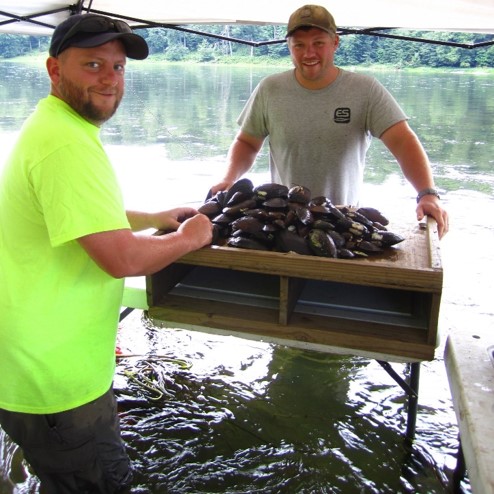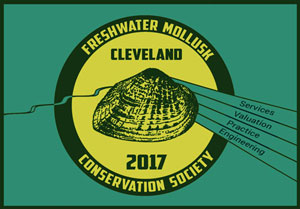EnviroScience Sponsors Upcoming Freshwater Mollusk Symposium in Cleveland, OH

EnviroScience project managers Dale Dunford (left) and Ryan Schwegman perform a mussel survey on the Allegheny River in Tionesta, PA.
STOW, OH (December 5, 2016)—EnviroScience, Inc. is a committee sponsor for the 10th biennial Freshwater Mollusk Conservation Society (FMCS) Symposium in Cleveland, OH, March 26-30, 2017. The FMCS is a not-for-profit, dedicated to the advocacy and conservation science of freshwater mollusk resources. This international society has a membership of 500, and 250 members generally attend the biennial symposiums. These professionals are constantly working to improve research and understanding of the world’s freshwater mollusks, and help bridge the gap between science and industry. The 2017 conference theme is The Roles of Freshwater Mollusks in a Changing Environment: Ecosystems, Engineering, Valuation, and Practice. The Local Committee has lined up an incredible group of national expert speakers who are sure to engage and inform. This symposium will include joint plenary sessions focusing on the key themes, contributed papers on a range of policy, research, and management topics. In addition to the platform and poster sessions, there will be a one-day snail identification and sampling workshop, a mussels of the Great Lakes identification workshop, and some exciting field trips to local attractions and water quality programs.
attend the biennial symposiums. These professionals are constantly working to improve research and understanding of the world’s freshwater mollusks, and help bridge the gap between science and industry. The 2017 conference theme is The Roles of Freshwater Mollusks in a Changing Environment: Ecosystems, Engineering, Valuation, and Practice. The Local Committee has lined up an incredible group of national expert speakers who are sure to engage and inform. This symposium will include joint plenary sessions focusing on the key themes, contributed papers on a range of policy, research, and management topics. In addition to the platform and poster sessions, there will be a one-day snail identification and sampling workshop, a mussels of the Great Lakes identification workshop, and some exciting field trips to local attractions and water quality programs.
North American streams, rivers, and lakes still support the richest diversity of freshwater mollusks on the planet. Over 700 species of snails and 300 species of freshwater mussels have been described by scientists so far. While there are species associated with every type of aquatic habitat, the greatest diversity is found in flowing streams. Native freshwater mollusks should not be confused with exotic / invasive species like Zebra Mussels that were introduced from Europe. Their population exploded in such numbers they choked out the native animals, drastically changing the economies and ecosystems of the Great Lakes and costing industry billions in maintenance and lost production. Zebra Mussels actually killed off most of the native mollusks in Lake Erie.
The FMCS symposium provides a great opportunity to network and build relationships with conservation professionals from state and federal government, industry, and conservation organizations. There will be several keynote speakers discussing the theme topics. Both oral and poster presentations about current research and recent developments on and about freshwater mollusks will be ongoing throughout the symposium. Two hands on workshops will be taught to help individuals identify (1) freshwater gastropods and (2) freshwater mussels in the Upper Ohio River and Great Lakes drainages. Attendees have the chance to go on two field trips: (1) a sightseeing tour to some of Cleveland’s greatest attractions (Cleveland Aquarium, Great Lakes Brewing Company, and the Rock and Roll Hall of Fame) and (2) a trip to “Restoration in Action” where attendees will visit an estimated four sites where habitat restoration and green infrastructure has been used to improve water quality and manage stormwater. The second field trip will be led by both EnviroScience, Inc. and North East Ohio Regional Sewer District (NEORSD) personnel.
Among the presenters will be EnviroScience’s Vice President Greg Zimmerman, who has over 22 years of experience in the fields of freshwater mussel and fish consulting. He will be speaking about the Hunter Station Bridge Replacement Project, where EnviroScience and the PennDOT / FHWA project team relocated 130,000 mussels from a PennDOT bridge. Mussels were re-introduced to 11 locations across the country, where the historic mussel populations had been killed off from habitat destruction and pollution. The project includes extensive diving, mussel salvage, transport and coordination activities across the U.S. to protect endangered mussel species, including the federally and state endangered Clubshell (Pleurobema clava) and Northern Riffleshell (Epioblasma torulosa rangiana). The project is the largest of its kind to date.
Other members of EnviroScience’s team will also be presenting at the symposium. They are all USFWS approved mussel and fish surveyors and are one of the only companies in the US that can dive to the stringent EM-385-1-1 specifications required for USACE and Federal projects.
For more information on the symposium, to attend meeting, or to submit an abstract please visit:
http://molluskconservation.org/index.html
About the sponsor:
EnviroScience, Inc. is a team of over 100 expert biologists, commercial divers, environmental scientists, and environmental engineers headquartered in Ohio, with additional offices in Nashville, Tennessee and Richmond, Virginia. Since 1989, EnviroScience has provided technical services to help clients meet their environmental design and regulatory requirements.